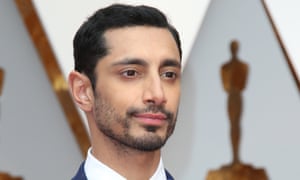Photograph: Dan MacMedan/GettyImages
Actor and rapper Riz Ahmed has warned that the enduring failure to champion diversity on TV is alienating young people, driving them towards extremism and into the arms of Isis.
Ahmed, known for his roles in Four Lions and the the Star Wars prequel Rogue One, said the lack of diverse voices and stories onscreen led people from minority backgrounds to “switch off and retreat to fringe narratives, to bubbles online and sometimes even off to Syria”.
Delivering Channel 4’s annual diversity lecture in Parliament, Ahmed said that in the light of the rise in racial and religious hate crimes post-Brexit, TV had a pivotal role to play in ensuring different communities felt heard, and valued, in British society.
“If we fail to represent, we are in danger of losing people to extremism,” he said.
“In the mind of the Isis recruit, he’s the next James Bond right? Have you seen some of those Isis propaganda videos, they are cut like action movies. Where is the counter narrative? Where are we telling these kids they can be heroes in our stories, that they valued?”
Ahmed’s recent roles include the HBO drama The Night Of and comedy series Girls, both American TV shows. Like Idris Elba, who delivered the lecture last year, Ahmed used the platform to criticise the fact he still had to go to the US to land major parts.
“It takes American remakes of British shows to cast someone like me,” he said. “We end up going to America to find work. I meet with producers and directors here and they say ‘we don’t have anything for you, all our stories are set in Cornwall in the 1600s’.”
Ahmed said British television still perceived diversity as a “frill or an added extra” and that if it is not addressed immediately, it would create more divisions across the country.
“People are looking for the message that they belong, that they are part of something, that they are seen and heard and that despite, or perhaps because of, their experience, they are valued. They want to feel represented. In that task we have failed.”
He added: “If we don’t step up and tell a representative story … we are going to start losing British teenagers to the story that the next chapter in their lives is written with Isis in Syria. We are going to see the murder of more MPs like Jo Cox because we’ve been mis-sold a story that is so narrow about who we are and who we should be.”
Ahmed said while growing up, the lack of Asian faces and stories on television had made him believe it was impossible for him to become an actor. It was only that several people had helped to champion him, and offered financial aid, that he made it to drama school and then landed his first film role.
He recalled that whenever actors such as Meera Syal or Sanjeev Bhaskar made rare appearances on TV “all of sudden I’d hear my mum shout ‘ASIAN’ and I’d run downstairs just to watch … I really want you to understand how much that meant to someone who doesn’t see themselves reflected back in culture. It’s a message that you matter.”
Ahmed called on the government to act, particularly to overturn the unconscious bias in hiring that was preventing talented people from black, Asian and minority backgrounds rising up the ranks. He said public money should be tied to representation targets for broadcasters to break the cycle of top jobs going mainly to white men.
His talk came on the same day that BBC director general Tony Hall admitted that the BBC and other broadcasters favoured the “well-connected and well-off” from the southeast. Hall told a conference that the television industry is a sector that was “too often the source of social exclusion”.
Original on "The Guardian" website
Original on "The Guardian" website
In 2015, BBC, Channel 4 and ITV and Sky launched the Diamond Project to monitor diversity across all broadcasters, while Ofcom said it may impose tougher penalties. By 2020 the BBC aims to have 15% of its workforce from black and ethnic minority backgrounds.

No comments:
Post a Comment